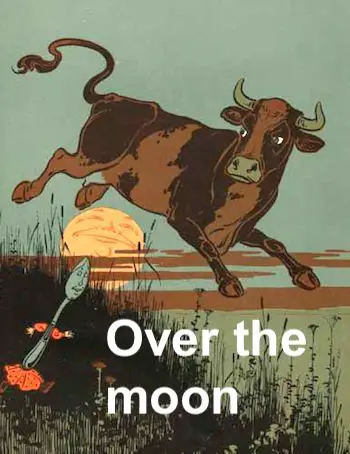Very happy or delighted.
Over the moon
What's the meaning of the phrase 'Over the moon'?
What's the origin of the phrase 'Over the moon'?
This phrase has been part of the language for more than a century. It has become more widely used in the past twenty or thirty years, since it was adopted by English football (no, not soccer please – the game is called football) managers when interviewed after ‘the lads’ managed a victory.
The increased use of televised post-match interviews and hours of studio commentary during the 1970s brought many football managers before the cameras. These days such men are likely to be cultured and erudite Frenchmen or Spaniards. Before that they were usually British ex-footballers who had left schools in the English or Scottish back streets early to play football. It’s fair to say that many of them have little interest in the finer points of English grammar.
Two of the best-known English football managers of recent years, who have maintained the English tradition with their engagingly entertaining way of mangling the language, are Ron Atkinson and Terry Venables. The list of quotations from them is long and includes:
“The Spaniards have been reduced to aiming aimless balls into the box.” (Atkinson)
“If you can’t stand the heat in the dressing room, get out of the kitchen.” (Venables)
“If Glenn Hoddle said one word to his team at half time, it was concentration and focus.” (Atkinson)
“I felt a lump in my throat as the ball went in.” (Venables)
The humorous magazine Private Eye picked up on these and began publishing them in its Colemanballs column. The name was taken from the sports commentator David Coleman, who could give even the managers a run for their money:
“Nottingham have now lost six matches in a row without winning.” (Coleman)
It was really Private Eye’s lampooning that made the phrase ‘over the moon’ popular. There is an associated phrase, ‘sick as a parrot‘, which was used when ‘the lads’ lost.
Well, that’s the football related usage in recent times; what about the real origin?.
The origin of ‘over the moon’ is much earlier and, although not widely used before the 1970s, it would have been familiar to all who grew up in Britain in the 20th century. Why, because the source was the influential 16th century nursery rhyme collection, Mother Goose’s Melody, circa 1760. The rhyme it appeared in was High Diddle Diddle:
High diddle diddle,
The Cat and the Fiddle,
The Cow jump’d over the Moon,
The little dog laugh’d to see such Craft,
And the Dish ran away with the Spoon.
As with most nursery rhymes, the first appearance in print may well post-date the first use by years, centuries even – children didn’t write their rhymes down. The text of such rhymes was subject to a ‘Chinese whispers’ effect over all of that time and, whatever the origin may have been, the version passed down to us is quite probably nonsense and isn’t easily interpreted. What is clear is that the ‘over the moon’ line is a reference to excitement and energy. That’s evidenced by one of the earliest allusions to the phrase in print – Charles Molloy’s The Coquet, or, The English Chevalier, 1718:
“Tis he! I know him now: I shall jump over the Moon for Joy!”
The history of “Over the moon” in printed materials
Trend of over the moon in printed material over time
Related phrases and meanings
Browse more Phrases
About the Author

Phrases & Meanings
A-Z
A B C D E F G H I J K L M N O P Q R S T UV W XYZ
Categories
American Animals Australian Bible Body Colour Conflict Death Devil Dogs Emotions Euphemism Family Fashion Food French Horses ‘Jack’ Luck Money Military Music Names Nature Nautical Numbers Politics Religion Shakespeare Stupidity Entertainment Weather Women Work
How did we do?
Have you spotted something that needs updated on this page? We review all feedback we receive to ensure that we provide the most accurate and up to date information on phrases.
